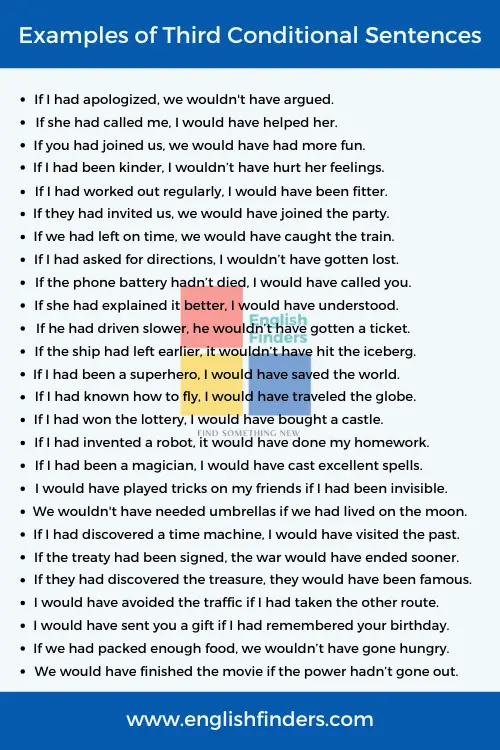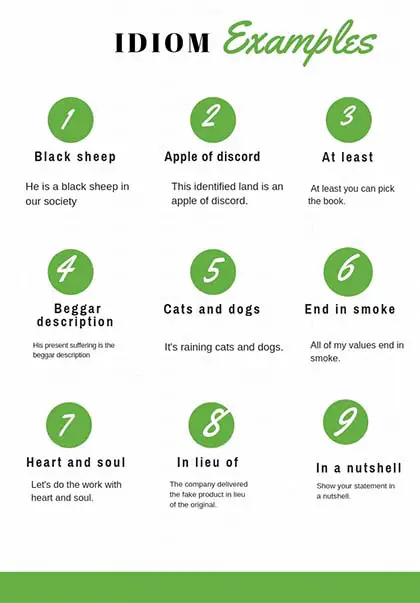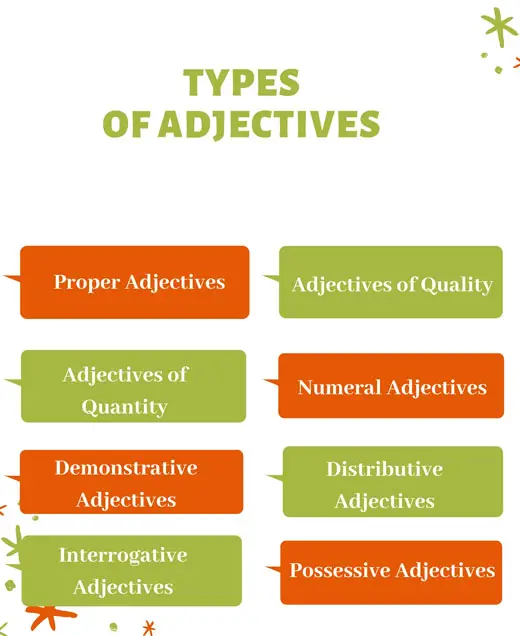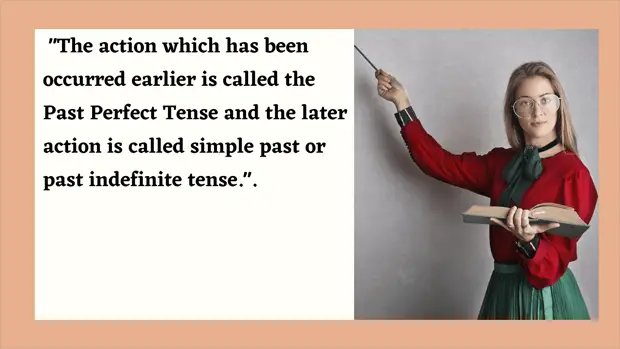Last updated on May 25th, 2025 at 07:07 pm
Third conditional sentences are used to describe unreal past situations. They help us describe events that didn’t happen but could have if certain conditions had been met. For example, “If I had got a job, I would have taken your responsibility.”
In this lesson, we’ll break down the third conditional sentences and their structure and share 50 practical examples to help you confidently use them.
What Are Third Conditional Sentences?
Quick Navigation
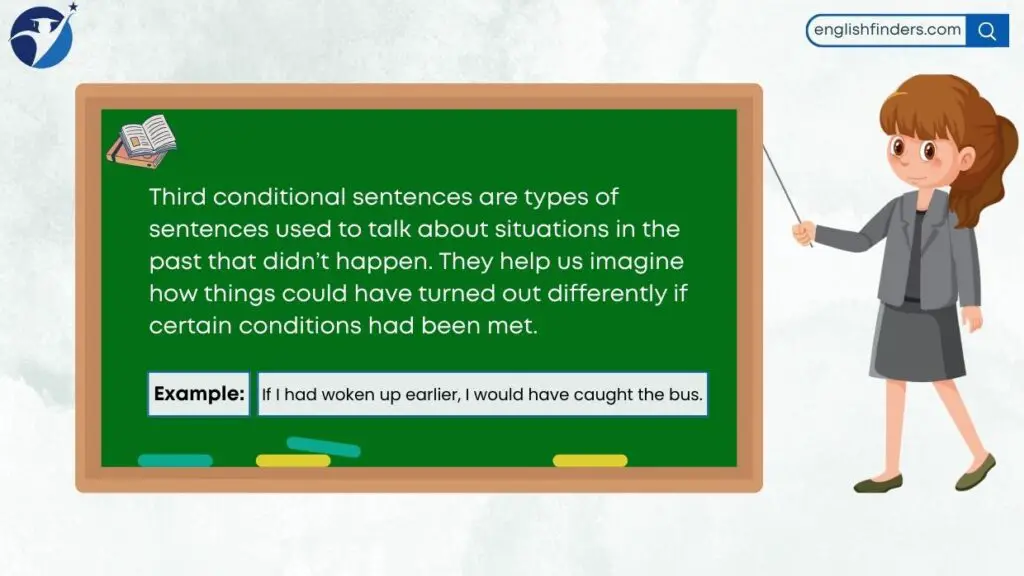
Third conditional sentences are types of sentences used to talk about situations in the past that didn’t happen. They help us imagine how things could have turned out differently if certain conditions had been met. Essentially, these sentences describe hypothetical or unreal scenarios in the past.
Let’s break it down:
- If-clause: Describes the condition and uses the past perfect tense.
- Main clause: Explains the imagined outcome using “would have” followed by a past participle.
Here’s an example:
- If I had woken up earlier, I would have caught the bus.
In this case, waking up earlier didn’t happen, so catching the bus was impossible. But we can still imagine it!
Structure of Third Conditional Sentences
If + past perfect, would have + past participle
For example:
- If they had invited me, I would have gone to the party.
- If she had practiced more, she would have won the competition.
When to Use Third Conditional Sentences
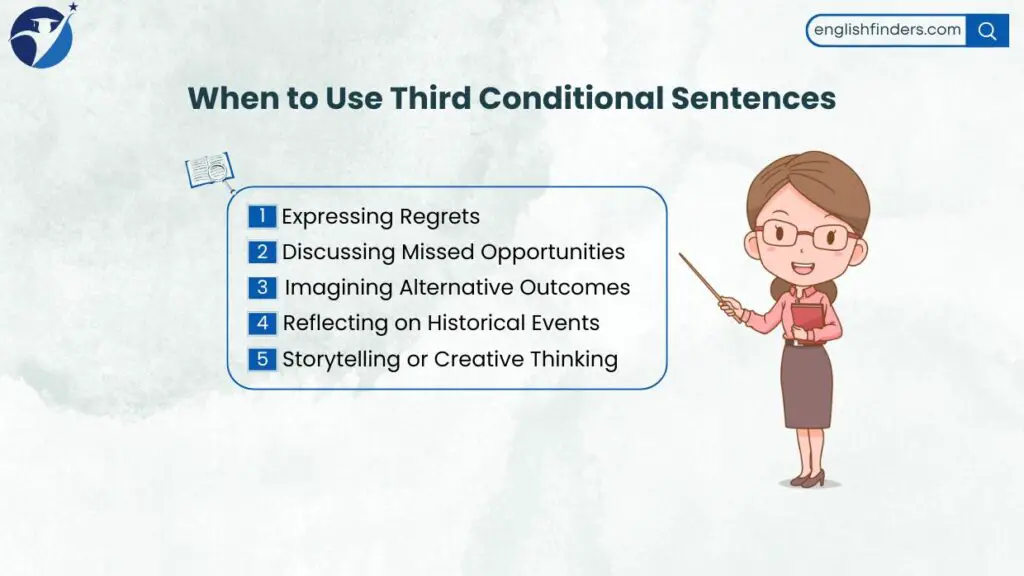
Third conditional sentences are perfect for talking about situations that didn’t happen in the past but could have had different outcomes. They allow us to reflect on “what might have been” and are incredibly useful in everyday conversations. Here are some common scenarios where you might use them:
Expressing Regrets
One of the most common uses of third conditional sentences is to express regrets or things you wish had happened differently.
- Example: If I had studied more, I would have passed the test.
- Here, the speaker regrets not studying enough, which causes them to fail the test.
Discussing Missed Opportunities
You can use the third conditional to talk about opportunities you missed in the past and how they could have changed the situation.
- Example: If we had left earlier, we would have caught the train.
- This suggests that leaving late caused them to miss the train, a missed opportunity.
Imagining Alternative Outcomes
You can also use third conditional sentences to imagine different outcomes for past events.
- Example: If he had taken the job, he would have moved to a different city.
- This imagines an alternative life path that didn’t happen.
Reflecting on Historical Events
The third conditional is a great way to reflect on historical “what if” scenarios.
- Example: If the team had scored one more goal, they would have won the championship.
- This reflects how one small change could have altered history.
Storytelling or Creative Thinking
When telling stories or imagining scenarios for fun, third conditional sentences add depth and creativity.
- Example: If I had been born in another country, I would have learned a different language.
- This makes storytelling more engaging and helps explore different possibilities.
50 Examples of Third Conditional Sentences
Here are 50 practical examples of third conditional sentences, categorized to make them easier to understand and relate to. Let’s explore them!
Personal Regrets
These sentences reflect on things we wish we had done differently.
- If I had apologized, we wouldn’t have argued.
- If I had been kinder, I wouldn’t have hurt her feelings.
- If I had worked out regularly, I would have been fitter.
- If I had cared for my health, I wouldn’t have fallen sick.
- I would have bought a new car if I had saved more money.
- I wouldn’t have been late for school if I had woken up earlier.
- I would have gotten the job if I had prepared for the interview.
- If I had listened to your advice, things would have been better.
- If I hadn’t procrastinated, I would have finished my project on time.
- If I had made the right decision, I would have avoided this suffering.
Missed Opportunities
These sentences highlight chances we didn’t take but wish we had.
- If she had called me, I would have helped her.
- If you had joined us, we would have had more fun.
- If they had invited us, we would have joined the party.
- If we had left on time, we would have caught the train.
- If I had asked for directions, I wouldn’t have gotten lost.
- If I had applied for that scholarship, I might have studied abroad.
- If he had attended the meeting, he would have learned something new.
- If we had booked tickets earlier, we would have gotten better seats.
- If I had taken the internship, I would have gained valuable experience.
- If they had planned better, the event would have been a success.
Hypothetical Scenarios
These sentences imagine alternative outcomes for specific situations.
- If it had rained, we would have stayed home.
- If I had worn a jacket, I wouldn’t have been cold.
- If the dog hadn’t barked, we wouldn’t have woken up.
- If the phone battery hadn’t died, I would have called you.
- If she had explained it better, I would have understood.
- If he had driven slower, he wouldn’t have gotten a ticket.
- I would have avoided the traffic if I had taken the other route.
- I would have sent you a gift if I had remembered your birthday.
- If we had packed enough food, we wouldn’t have gone hungry.
- We would have finished the movie if the power hadn’t gone out.
Historical What-Ifs
These sentences reflect on how history might have changed.
- If the ship had left earlier, it wouldn’t have hit the iceberg.
- If the team had scored earlier, they would have won the match.
- If the explorers had had better maps, they wouldn’t have gotten lost.
- If the weather had been better, the battle might have ended differently.
- If the treaty had been signed, the war would have ended sooner.
- If they had discovered the treasure, they would have been famous.
- If the scientist had lived longer, he would have made more discoveries.
- If the artist had painted more, his work would have been legendary.
- The country would have prospered if the leader had listened to his advisors.
- If the invention had been completed on time, it would have changed the world.
Fun or Creative Scenarios
These sentences imagine playful or unrealistic situations.
- If I had been a superhero, I would have saved the world.
- If I had known how to fly, I would have traveled the globe.
- If I had discovered a time machine, I would have visited the past.
- I would have played tricks on my friends if I had been invisible.
- If I had won the lottery, I would have bought a castle.
- We wouldn’t have needed umbrellas if we had lived on the moon.
- If I had been a famous actor, I would have starred in blockbuster movies.
- If I had invented a robot, it would have done my homework.
- If I had been able to talk to animals, I would have asked my dog for advice.
- If I had been a magician, I would have cast excellent spells.
Final Thoughts
Third conditional sentences provide a unique way to express yourself in English. They help reflect on past regrets, discuss missed opportunities, or imagine fun and creative scenarios. Using third-conditional sentences can enhance your language skills significantly. In this lesson, we explored third conditional sentences, provided 50 examples, and discussed when to use them.

Azizul Hakim is the founder & CEO of englishfinders.com. He is a passionate writer, English instructor, and content creator. He has completed his graduation and post-graduation in English language and literature.

